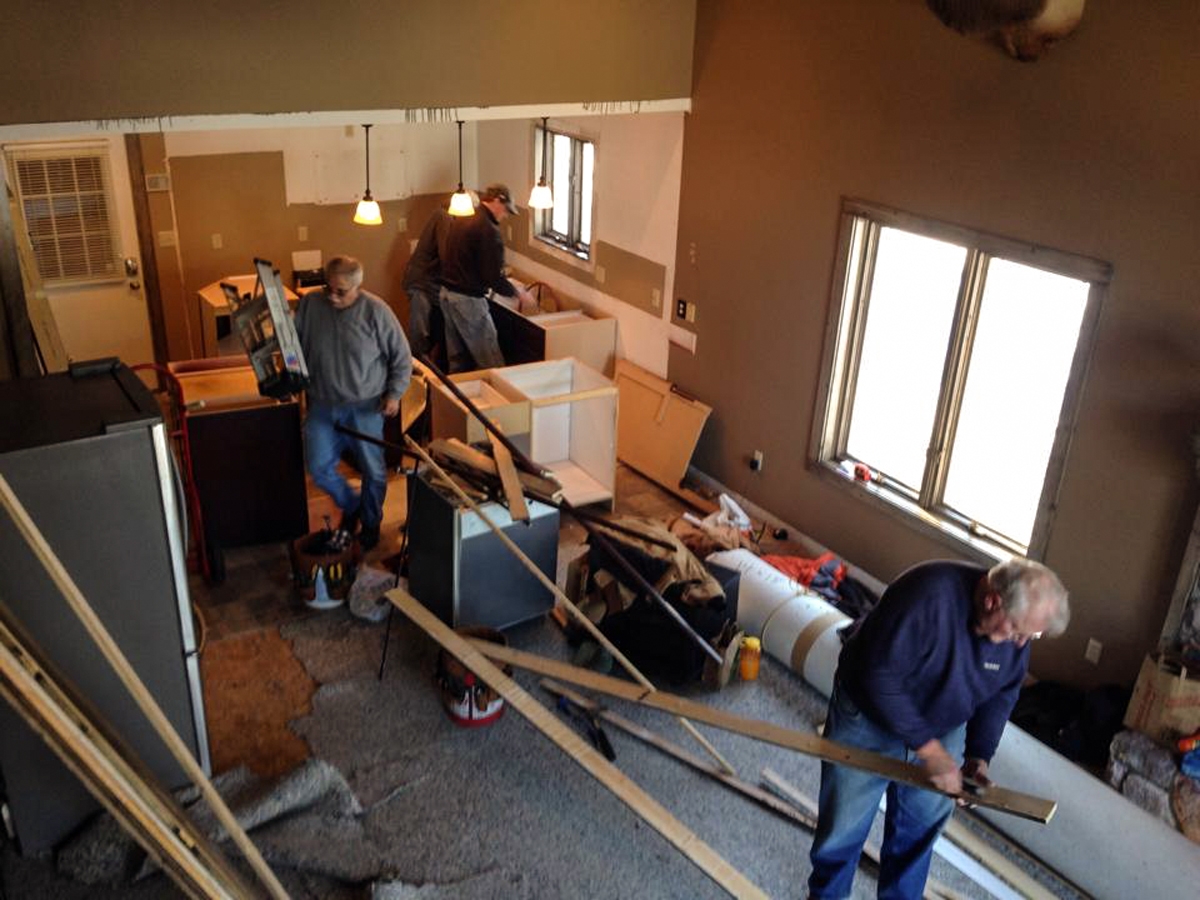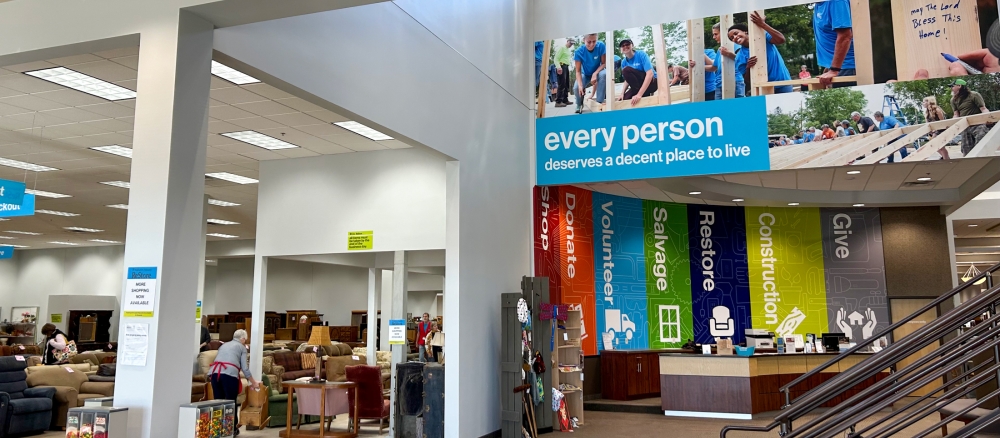With its recent move to the East Brainerd Mall, the Lakes Area Habitat for Humanity’s ReStore seemingly has it all with triple the space and wide aisles free of clutter. All except, perhaps, enough donated furniture and salvaged building materials to fill its sales floor.
But with a recent grant from the MPCA and in partnership with Habitat for Humanity Minnesota, Lakes Area Habitat for Humanity is able to pick up donated items over a wider area and expand its deconstruction and salvage programs. By recruiting more volunteers to pick up materials and reaching more contractors to educate them about the salvage program, this funding will allow the organization to fill its sales floor while significantly reducing the amount of waste going to the Pine River Transfer Station.
“Without this funding, our reach was limited to roughly 45 miles from Brainerd, leaving all the area from Pine River to Cass Lake unserved,” said Kevin Pelkey, executive director for Lakes Area Habitat for Humanity. “With the miles and miles of lakeshore, there certainly are residents to collect donations from and to step in with our salvage program.”
While keeping waste out of landfills through furniture donations and its salvage program are big focus areas for the organization, its main goal is to ensure that every dollar donated or raised from sales goes directly toward home builds.
“Through our ReStore, thousands of pounds of materials are diverted from the landfill and given a second life by offering good, reusable materials for sale to the general public, which is awesome,” Pelkey said. “But our main focus is on having the proceeds support the work of Lakes Area Habitat for Humanity helping build decent, affordable homes throughout Crow Wing, Cass, Hubbard, and Wadena counties for those in need.”

Lakes Area Habitat for Humanity is one of three affiliate subgrantees partnering with Habitat for Humanity Minnesota to expand their deconstruction and salvage programs across the state. Currently, it is one of five Habitat for Humanity ReStores to offer deconstruction services to Minnesotans. Habitat for Humanity of Douglas County and Two Rivers Habitat for Humanity will also receive a portion of this funding.
Keeping building materials out of landfills
Habitat for Humanity Minnesota’s grant is one of eight totaling nearly $2.4 million that the MPCA has awarded for projects focused on sustainable building and materials management strategies that reduce waste and increase deconstruction, salvage, and reuse in Minnesota.
The U.S. Environmental Protection Agency estimates nearly 600 million tons of construction and demolition debris are generated in the United States annually, which is more than twice the amount of generated mixed municipal solid waste. In addition, manufacturing new building materials requires large amounts of resources and energy and creates significant pollution and waste. Extending the life of existing structures and reusing building materials reduces both waste and greenhouse gas emissions.
"Minnesotans told us that funding was essential to drive real change for sustainable building practices, and we listened,” said Melissa Wenzel, the MPCA's built environment sustainability administrator. “Thanks to strong legislative support, we were fortunate to receive significant funding that will help make a real difference. Requests for funding far exceeded the amount of available funds, clearly demonstrating the strong interest and demand for sustainable built environment projects across Minnesota.”
Grant recipients
Habitat for Humanity Minnesota
- Grant award: $409,000
- Project cost: $512,500
Habitat for Humanity Minnesota plans to expand its deconstruction and salvage program throughout the state by supporting three habitat affiliates to expand or start deconstruction and salvage programs. Habitat for Humanity of Douglas County will use funds to create a reclaim program implementation plan and develop architectural plans to expand its existing ReStore. Lakes Area Habitat for Humanity’s deconstruction program will expand into the northern tier of Cass County, largely comprised of the Leech Lake Reservation and area lakes. Two Rivers Habitat for Humanity’s salvage program will expand at a time when construction growth in the Rochester community is at an all-time high.
Twin Cities Habitat for Humanity
- Grant award: $199,994
- Project cost: $279,859
Twin Cities Habitat for Humanity plans to use awarded grant funding to launch a third ReStore location in the northwest area of Hennepin County to meet growing consumer demand for highly affordable home remodeling materials and furnishings. The new store has the potential to reach more than 950,000 donor households and secure more than 7,000 donations annually, which could lead to salvaging an additional 4.3 million pounds from the waste stream within the first four years.
Hennepin County
- Grant award: $333,637.20
- Project cost: $490,426.69
Hennepin County plans to work with Reuse MN, Rethos, AIA MN, US Green Building Council, the University of Minnesota, MSR Design, and Doors Unhinged to develop a circular building materials economy in Minnesota. It plans to use grant funding to help owners and designers adjust their procurement process to allow for more material reuse, build demand for reclaimed commercial building materials through engagement and pilot projects with large organizations, and spur development of businesses and organizations offering reclaimed commercial building material products or services to support market growth.
Hubbard County Solid Waste
- Grant award: $658,000
- Project cost: $822,500
Hubbard County Solid Waste plans to use awarded grant funding to renovate and expand its reuse center operations to serve its community. It will also use funding for education, training, and outreach.
Carver County
- Grant award: $186,814
- Project cost: $260,711
Carver County plans to partner with Nordic Waste, material reuse nonprofits, and several cities within the county to create a comprehensive building material reuse program that brings together key partners with extensive experience in deconstruction and material reuse. Grant funding will be used to start a microgrant program, create building materials reuse drop sites, conduct building materials reuse education and outreach, and lease space to create the Southwest Metro Reuse Store. This collaboration will transform Carver County’s building reuse grant pilot into an ongoing dedicated building material reuse system that offers residents unique reuse services.
Dodge County
- Grant award: $200,000
- Project cost: $250,000
Dodge County plans to improve the Renovation ReUse facility to enable year-round operation and increase landfill diversion. It will use grant funding for site preparation, permitting and utilities, construction, hiring staff, and marketing and community outreach for the facility.
East Central Solid Waste Commission
- Grant award: $180,000
- Project cost: $240,000
East Central Solid Waste Commission plans to partner with Better Futures MN to build and operate a reuse center at the Cambridge Transfer station to collect, store, and redistribute building materials.
Rethos
- Grant award: $304,720
- Project cost: $406,450
Rethos plans to serve as the educational and training arm of the deconstruction movement in Minnesota. It will partner with Build Reuse to create a series of 16 on-demand digital deconstruction courses, certified through DLI for Contractor Continuing Education, provide in-person deconstruction training, and create 10 core competencies and material reuse ecosystem classes. By creating these educational materials, Rethos has the goal to train 20 new contractors annually.

